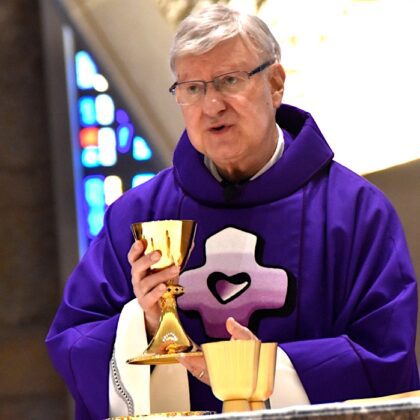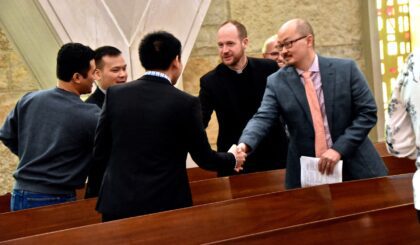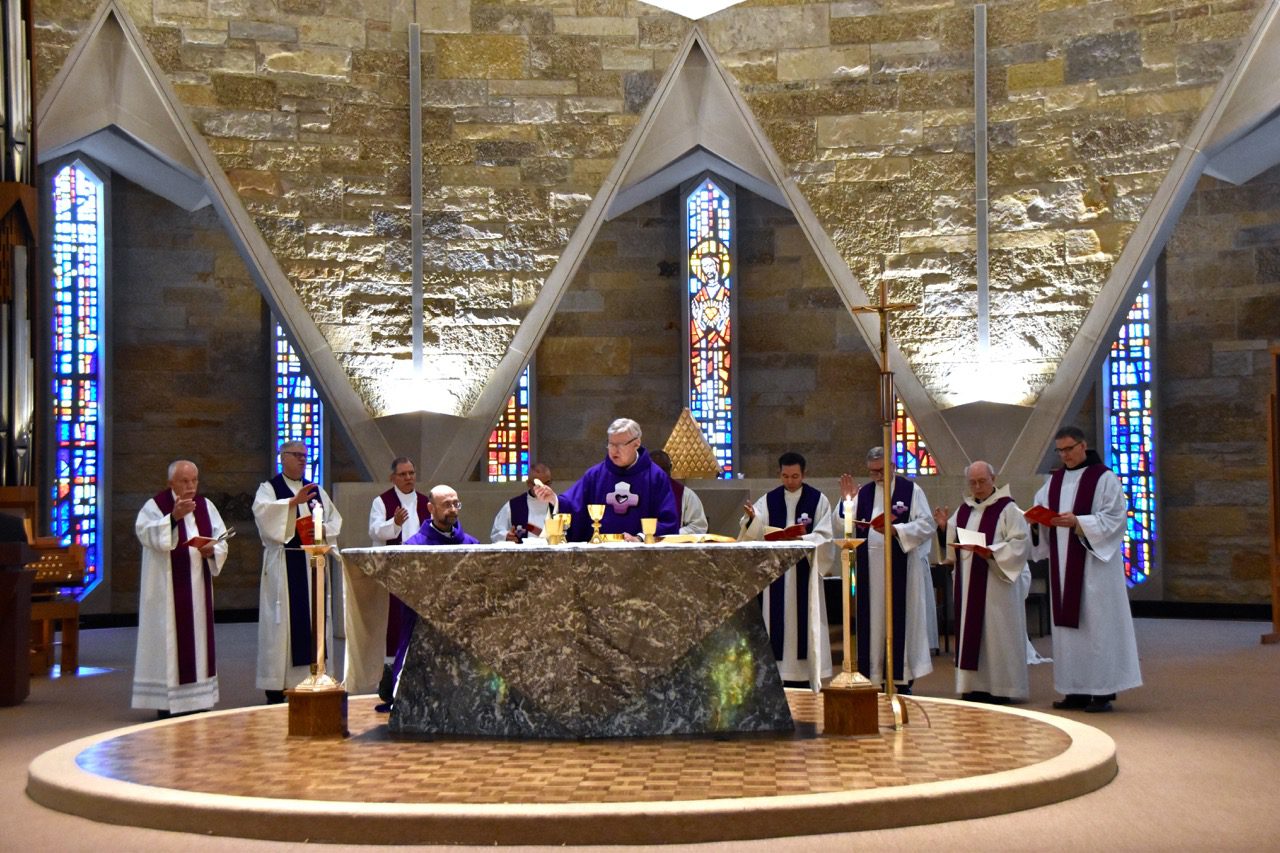“Fr. Leo Dehon, whom we remember in a special way this week, would often refer to his life and ministry as ‘one never-ending Mass.'”
The quote is from Fr. Jim Walters, SCJ, the main celebrant at today’s Mass at Sacred Heart Seminary and School of Theology; the liturgy was dedicated to the memory of Fr. Leo John Dehon, founder of the Priests of the Sacred Heart [Dehonians]. March 14 is the 177th anniversary of his birth and celebrated in the congregation as “Dehonian Vocation Day.” The following is Fr. Jim’s bilingual homily in full:
“¿Podrán beber el cáliz que yo he de beber? El que quiera ser grande entre ustedes, que sea el que los sirva, y el que quiera ser primero, que sea su esclavo; así como el Hijo del hombre no ha venido a ser servido, sino a servir y a dar la vida por la redención de todos.”

“Can you drink the chalice that I am going to drink? Whoever wishes to be great among you shall be your servant; whoever wishes to be first among you shall be your slave. Just so, the Son of Man did not come to be served but to serve and to give his life as a ransom for many.”
¿Podrás tú beber el cáliz? ¿Sabes bien lo que te costará? Are you willing to drink the chalice? I would venture to guess that few of us have considered answering this question. Claro que todos creemos que somos llamados a servir sea como sacerdotes, diáconos, seminaristas, o laicos, pero ¿nos damos cuenta de lo que nos cuesta en realidad? Yes, we believe we are called to serve as priests, deacons, seminarians, and laity, but what is the true cost of service?
The prophet Jeremiah becomes the “voice on behalf of the victims of sin” as he cries out to God for justice against those who plot against him despite his very efforts to turn the wrath of God away from them. His words echo in Psalm 31: “My trust is in you, O Lord; I say, ‘You are my God.’”
Christ, who has just given the third prediction of his passion, now experiences in the blindness of his own disciples John and James their total lack of understanding of who he is and what it will mean to “drink the chalice.” Their focus is on position and power and a desire to see judgement against those who refuse to see the mission of Christ. Yet, they are no different than those they are judging. Ellos mismos no quieren aceptar que Jesucristo no vino para ser servido sino para servir dando su vida por todos. They are unwilling to face suffering and accept that the Messiah is not the political leader they had hoped for but rather one who came to serve and offer his life for all. Es solamente en comunión con el amor de su Padre que Cristo puede “beber el cáliz.” It is only in union with the Heart of the Father that Christ is able to “drink the chalice.” Without this relationship his suffering is meaningless.

Lent is a time to focus on the challenge of accepting suffering in life not its own sake but, as Christ has taught us, united to the Heart of the Father. We will encounter suffering both in our own lives and in the lives of those who come to us in our ministry. Para aceptar a los que se nos acercan sufriendo y ofrecerles la compasión que buscan, tenemos que abrirnos el corazón abrazando el misterio pascual del sufrimiento, de la muerte y de la resureccion de Jesucristo. To embrace them in the most difficult and heart-breaking moments of their lives, we must first be able to embrace the Paschal Mystery, coming to know Christ in his suffering, dying and rising.
Fr. Leo Dehon, whom we remember in a special way this week, would often refer to his life and ministry as “one never-ending Mass.” He understood the Mass he celebrated each day as that moment which united him with the suffering, despair, and hopelessness of those he was called to serve. As he drank from the chalice and shared in the blood of Christ, he believed he was called to embrace the suffering of Christ as he encountered those ignored by society, treated unjustly, misunderstood and unloved. It was only united to the Paschal Mystery that he could find the strength and compassion to accompany them in their darkest moments and offer them the hope of God’s love.
Hay que responder que “sí yo puedo beber el cáliz pero solamente unido con Cristo Jesús que vino a servir. We must be able to say, “Yes, I can drink the chalice,” accepting that we cannot do this alone but only united with Christ the Servant. Esto solo se puede realizar cuando estamos dispuestos a dejar el control sobre otros, y poner toda la confianza en Dios mismo. This can only happen when we are first willing to let go of our need to control and totally entrust our lives into the hands of the One who has called us to serve.
As we come to the table of the Eucharist and “drink from the chalice his blood, the blood of the new and eternal covenant poured out for us and for many for the forgiveness of sins” may we find the strength to serve our brothers and sisters in their suffering with the hope of the resurrection.
Click here to view more photos from the Mass.


